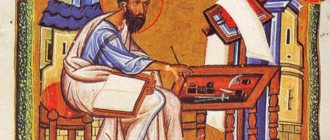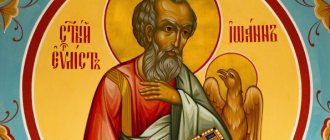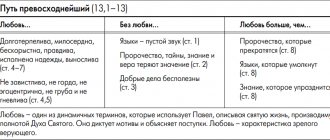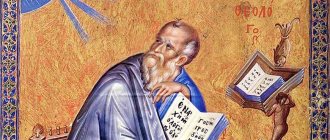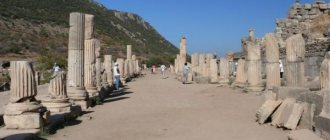Authorship
The language, style and teaching of the Epistle are so close to the fourth Gospel that it is difficult to doubt that they belong to the same author. Tradition, which can be traced back to the century, believes that he is the ap. John the Theologian. The earliest quotation from the First Epistle of St. John refers to 115 (St. Polycarp of Smyrna. Philippians, 7). Papias of Hierapolis, Clement of Alexandria, Origen and other writers of the 3rd century refer to it as a work of the apostle John. St. Dionysius the Great, who had a keen critical sense, definitely identifies the writer of the Gospel of John and the First Epistle of John. Expressions like 1 John. 2:7 indicate that the Epistle was written many years after the events of the Gospel. Apocalyptic motifs (“the last time,” “Antichrist”) distinguish, however, the Epistle from the fourth Gospel. In this regard, it has been suggested that the epistle precedes the Gospel of John in time. The question remains open about the false teachers mentioned in the message. The most widespread is the opinion substantiated by the archbishop. Vasily (Bogdashevsky), according to whom these false teachers were early Gnostics. The apostle himself often uses words associated with the concept of gnosis - knowledge (2: 3.5; 3: 10, 14, 16, 24; 4: 2, 6, etc.). But even in the Old Testament the word daat
- knowledge - appears as a synonym for faith.
1:1-3 About what was from the beginning, what we heard, what we saw with our eyes, what we looked at and touched with our hands, about the Word of life. Here John is not talking about Scripture as such, but about Jesus as the one who brought and fulfilled the word of God. John writes that through human senses, which hear, examine and touch, one can tell about what has entered through them into the minds and hearts of Christ’s disciples. And everything that fits into the minds and hearts is no longer in mortal flesh, but is sown in the human spirit, in beliefs and perceptions, which is much more reliable than what is sown in mortal flesh, for internal convictions do not decay.for life has appeared, and we have seen and testify and proclaim to you this eternal life, which was with the Father and appeared to us. It was Jesus who brought eternal life to men. In what sense?
1) by redeeming us with his death and making it possible for humanity 2) by showing the way (way of life) through which we can approach God and receive eternal life. We proclaim to you what we have seen and heard, so that you too may have fellowship with us: and our fellowship is with the Father and His Son, Jesus Christ. John was a direct participant in the events and personally saw everything that happened and heard the word Christ - from the mouth of Jesus himself.
Communication with the Father and His Son means for each of us that there is an opportunity to find out what everyone needs to do in order to live forever. Through this Word of life, transmitted by Christ, Christians seem to communicate with God Himself and His Christ. 1:4-7
And we write these things to you, that your joy may be complete.
5 And this is the gospel that we have heard from Him and proclaim to you: God is light, and in Him there is no darkness at all. 6 If we say that we have fellowship with Him, but walk in darkness, then we lie and do not practice the truth; 7 But if we walk in the light, as He is in the light, we have fellowship one with another, and the blood of Jesus Christ His Son cleanses us from all sin. John shares his own joy, for what is not there cannot be shared with others. And his joy is unusual, not one of those that often occurs because of the satisfaction of the flesh, but precisely because of the knowledge of God’s love in the face of Christ - the joy of John. And he writes to fellow believers in order to strengthen their joy in the knowledge gained through the gospel. The essence of the gospel is that God is light, there are no dark spots in him. And God cleanses our dark stains of sins with the help of the blood of Christ (thanks to the sacrifice of atonement).
Usually all deeds that are good and kind in the eyes of God are done in plain sight (in the light), for those who do them are sure that by doing so they glorify God. Only those deeds that are evil in the eyes of God are hidden in the darkness. Therefore, those deeds that do not glorify God are better for His servants not to do: for everyone who does evil hates the light and does not come to the light, lest his deeds be exposed, because they are evil, but he who does righteousness comes to the light. so that his deeds may be evident, because they are done in God -
John 3:20-21. If someone claims to communicate with God and Christ, but does dark things (does wrong), he is a liar. And whoever does the works of light, it is clear even without a statement that he is in fact in close communion with the Father and His Son and that communication with the Highest has a positive influence on him in everything, if he imitates God and Christ in his righteous way life. It is precisely about THIS one who walks in the light in practice (and not who just declared this) that we can say with confidence that the blood of Jesus cleansed him from all sin and opened access to God, otherwise a Christian would not be able to be in close communion with God and mind with righteousness - to gain from Him.
1:8,9 If we say that we have no sin, we deceive ourselves, and the truth is not in us. 9 If we confess our sins, He, being faithful and righteous, will forgive us our sins and cleanse us from all unrighteousness.
If, because we have received the opportunity to communicate with the Highest, we hasten to declare our infallibility, then we are not acting in truth, we are deceiving ourselves, for there is no righteous man from sinful Adam.
If we realize that we are sinful, we do not close ourselves off, but open to God EVERYTHING that concerns us and in which we sin, then our sins are forgiven thanks to the righteousness and faithfulness of Christ, for if he had not maintained his faithfulness, his sacrifice of redemptive power would not have been possible. had.
1:10 If we say that we have not sinned, then we represent Him as a liar, and His word is not in us.
If, as servants of God, we say that we do not sin, then we show that God is lying, for He Himself says that ALL sinned in Adam (Rom. 5:12) - in contrast to what we say about ourselves. Yes, and Jesus came for this purpose, to atone for our sins (1 John 2:2). And if we were righteous and had no sin, we would not need Christ.
So we are not in a hurry to consider ourselves righteous, who have automatically achieved perfection thanks to the blood of Christ, but we are in a hurry to consider ourselves sinners to whom God, through Christ, has given a chance to achieve a state of holiness.
Content
The first epistle of John is not an epistle in the strict sense of the word. This is an inspired sermon on the essential foundations of the Christian life. Unity with Christ, love for God and for people as something inseparable - these are the main themes of this Message. The apostle is speaking to beginners of all ages.
Ep. Cassian (Bezobrazov) Fr. Any division of this message into its component parts must be considered conditional.”
The aphoristic nature of the Epistle gave rise to a number of exegetes (for example, Bultmann) to consider it a mosaic work, formed from different sources. But the correctness of this opinion is impossible to prove precisely due to the literary features of the Epistle. In it, the apostle’s speech flows in a single stream, in which there is no strictly logical sequence. Lohmeyer's attempt to isolate 7 parts in the Message is quite arbitrary.
1st Council Epistle of the Apostle John
1
My children, I am writing this to you so that you will not sin. And if anyone sins, we have Jesus Christ, the Righteous, as an Advocate with the Father.
2
And He Himself is the propitiation for our sins, and not only for ours, but also for the sins of the whole world.
3
And we know that we have come to know Him by keeping His commandments.
4
Whoever says, “I have known Him,” and does not keep His commandments, is a liar, and there is no truth in him.
5
And whoever keeps His word, in him truly the love of God is perfect. By this we know that we are in Him.
6
He who says that he abides in Him must also act as He did.
7
Beloved, I am not writing you a new commandment, but an ancient commandment which you had from the beginning: the ancient commandment is the word which you have heard.
8
But at the same time I write to you a new commandment, which is true in Him and in you, because the darkness is passing away, and the true light is already shining.
9
Whoever says that he is in the light and hates his brother is in darkness to this day.
10
He who loves his brother abides in the light, and there is no offense in him,
11
But whoever hates his brother is in darkness, and he walks in darkness and does not know where he is going, because the darkness has blinded his eyes.
12
I am writing to you, children, because your sins have been forgiven for His name’s sake.
13
I am writing to you, fathers, because you have known Him who was from the beginning. I am writing to you, young men, because you have overcome the evil one.
14
I wrote to you, children, because you have come to know the Father. I have written to you, fathers, because you have known Him who was from the beginning. I wrote to you, young men, because you are strong, and the word of God abides in you, and you have overcome the evil one.
15
Do not love the world, nor the things in the world. If anyone loves the world, the love of the Father is not in him,
16
because everything in the world: the lust of the flesh and the lust of the eyes and the pride of life is not from the Father, but from the world.
17
And the world passes away, and so does its lust; but he who does the will of God abides forever.
18
Children, the last hour: and as you have heard that the Antichrist is coming, and now many antichrists have appeared; hence we know that it is the last hour.
19
They came out from us, but they were not ours; for if they had been ours, they would have remained with us: but they went out so that it would be revealed that they were not all ours.
20
You have the anointing of the Holy One and know everything.
21
I wrote to you not because you do not know the truth, but because you know it, and that every lie is not from the truth.
22
Who is a liar if not the one who denies that Jesus is the Christ? This is the Antichrist, denying the Father and the Son.
23
Anyone who denies the Son does not have the Father. He who confesses the Son also has the Father.
24
What you have heard from the beginning abide in you; If that which you have heard from the beginning abide in you, then you also will abide in the Son and in the Father.
25
And this is His promise, which He Himself promised us: eternal life.
26
This is what I wrote to you about those who are misleading you.
27
But the anointing that you received from Him remains in you, and you do not need anyone to teach you; but since His anointing teaches you all things, and is true and not a lie, then continue in it, as it has taught you.
28
And now, children, abide in Him, so that when He is revealed, we may have boldness and not be put to shame before Him at His coming.
29
If you know that He is righteous, know that everyone who does righteousness is born of Him.
Literature
- Metropolitan Anthony (Khrapovitsky), Works of St. ap. John the Theologian, Warsaw, 1928;
- Barkley W., Interpretation of the Last. John and Jude, trans. from English, Washington, 1986;
- Bogdashevsky D.I., False teachers exposed in the first Epistle. Apostle John, K., 1890;
- Bukharev A.M., On the conciliar Apostolic Epistles, BT, collection 9, 1972;
- [Glagolev A.], First Sobornoe Last. St. Apostle John the Theologian. - Second Council Last. St. Apostle John the Theologian. — Third Council Last. St. Apostle John the Theologian, TB, vol. 10, pp. 308-350;
- Glubokovsky N.N., Notes on the first last. St. Apostle John the Theologian, KhCh, 1904, No. 6; Ep.
- Evdokim (Meshchersky), St. apostle. and ev. John the Theologian, his life and evangelist. works, Serg.Pos., 1898;
- archbishop Eusebius (Orlinsky), Conversations at the First Council. St. ap. and ev. John the Theologian, St. Petersburg, 1864;
- prot. Zefirov N., Public explanation of the apostolic epistles, Mogilev, 1912;
- Apostle. Acts and Epistles of the Apostles with the Apocalypse. To the glory. and Russian adverbs. With a preface and details explanations of Bishop Michael, books 1-2, Kyiv, 19052;
- Ep. Nikanor (Kamensky), Explanatory Apostle, parts 1-3, St. Petersburg, 1904-05;
- Pitirim, Archimandrite Volokolamsk, Pastoral didactics of St. Apostle and Ev. John the Theologian, ZhMP, 1984, No. 3;
- prot. Polotebnov A. (preface, notes), John the Theologian. Cathedral Sequences Apostle of Love St. John the Theologian I, II, III for glory. and Russian adverbs, M., 1875;
- Sagarda N., First cathedral last. St. ap. and ev. John the Theologian, Poltava, 1903;
- his, Cathedral Sequences. ap. and ev. John the Theologian, PBE, vol. 6, pp. 837-61;
- Farrar F.V., The first days of Christianity, parts 1-2, St. Petersburg, 1888;
- Kheraskov M.I., Apostolic Epistles and Apocalypse, Vladimir, 19073;
- Brown R., The Community of the Beloved Disciple, NY, 1979;
- Bruce FF, The Epistles of John, L., 1970;
- Laplace J., Discernement pour temps de crise, P., 1978;
- Perkins Ph., The Johannine Epistles, Chi., 1979;
- Stott JR, Epistles of John, L., 1964;
- JBC, v.2, p.404-13;
- RFIB, v.2;
- NCCS, p.1257-62.
